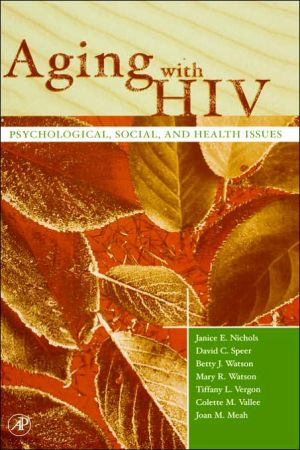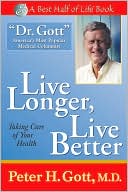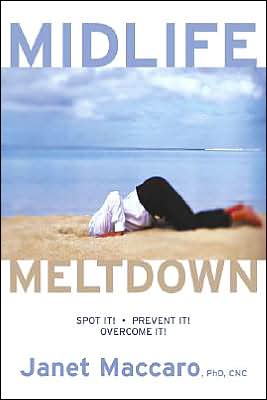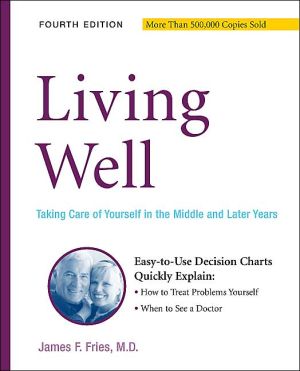Aging with HIV: Psychological, Social, and Health Issues
In 1998, approximately 30 million people worldwide were living with HIV/AIDS, about 5 million of whom became infected that year. The epidemic continues to expand, with an estimated doubling time of 10 years, making AIDS the leading infectious cause of death ahead of tuberculosis and malaria. Even in the U.S.A. where the death rate from AIDS is declining as a result of effective drug therapies, HIV infection rates continue to climb in several population groups. The prevalence of AIDS among...
Search in google:
"Aging with HIV: Psychological, Social, and Health Issues is a comprehensive look into the struggles that older people with HIV face. The interviews offer an insight into the complicated struggles of a segment of the HIV population that has often been forgotten. Sex and substance use are alive and well in the older population. Providers involved with the care of older people need to have in-depth information on the impact of HIV on aging. This book is a real 'eye opener' for clinicians, care managers, and anyone who makes decisions about HIV care."—Donna Gallagher, Director, New England AIDS Education and Training Center, Boston, U.S.A."The interweaving of descriptive findings from the 172 HIV+ subjects and the in-depth data from the 15 people living in Florida, along with a comprehensive application of the professional literature, enhances our understanding of the realities of aging and living with HIV/AIDS. This work is a 'must have' resource for providers and researchers interested in the lives of middle-aged and older people living with HIV/AIDS."—Kathleen M. Nokes, CUNY, U.S.A."In one of the first scientific book length reports of older HIV positive people, the authors sensitively reveal the vulnerability, depression, poverty and isolation of one of the fastest growing portions of the epidemic. Their attention to these often hidden people, often living in minority communities, calls upon all of us to change our thinking about older adults and develop education, service, and support programs to address their needs."—Nathan L. Linsk, Principal Investigator, Midwest AIDS Training and Education Center, Founding Co-chair, National Association of HIV Over Fifty, University of Illinois at ChicagoAlthough the percentage of total HIV cases attributed to older adults is increasing, we know little about how the disease affects them. From providing appropriate medical and social services to combating ageism and social discrimination, health and social services workers can significantly increase their effectiveness if they recognize the differences between HIV/AIDS in younger and older people.This study uses a broad, interview-based survey of people living with HIV over the age of 45 in the West Central Florida area. Encompassing demographics, health, treatment, accessed services and patients' social lives and mental health, its quantitative and qualitative data offers a thorough and useful profile of older adults with HIV. Booknews Referring to a West Central Florida research project survey of adults 45 and older living with HIV as a chronic rather than terminal illness, Nichols (aging and mental health, U. of South Florida, Tampa) and her colleagues discuss the growing incidence of the disease among older adults, and the prevention, medical, attitudinal, and support services challenges that this population poses in addition to the usual issues of aging. Based on their findings validating that such variables as education level, substance abuse, and pre-infection medical status correlate with mental health, recommendations are made regarding policy and service planning. Project details and the interview schedule are appended. The authors are also affiliated with the Louis de la Plarte Florida Mental Health Institute. Annotation c. Book News, Inc., Portland, OR
PrefaceAbout the Authors1HIV/AIDS in Middle-Aged and Older Adults: A Research Response32Findings from the West Central Florida Survey of Middle-Aged and Older Adults with HIV Disease153The Experience of Older Adults Living with HIV334Overview of the Biomedical Aspects of HIV and Its Impact on Older Adults835HIV-Related Stressors, Coping, and Social Support113Ch. 6Mental Health and HIV133Ch. 7Providing Services to Older Adults with HIV Disease1578People of Color: HIV Prevention and Treatment Issues1979Effects of HIV Disease on Women22910Older Adult Sexuality and HIV24711End of Life Issues26512HIV Prevention and Outreach28513In Conclusion311App. AMiddle-Aged and Older Adults with HIV Disease: West Central Florida Survey Project Description and Results327App. B: Older Adult HIV/AIDS Interview Schedule359Index381
\ From the Publisher"Overall, the book is written in a highly accessible and jargon-free style."\ -Ageing and Society, 2004\ "HIV in Middle-Aged and Older Adults: Mental Health, Health, and Social Issues is a comprehensive look into the struggles that older people with HIV face. The interviews offer an insight into the complicated struggles of a segment of the HIV population that has often been forgotten. Sex and substance use are alive and well in the older population. Providers involved with the care of older people need to have in-depth information on the impact of HIV on ageing. This book is a real 'eye opener' for clinicians, care managers, and anyone who makes decisions about HIV care."\ - Donna Gallagher, Director, New England AIDS Education and Training Center, Boston, USA\ "The interweaving of descriptive findings from the 172 HIV+ subjects and the in-depth data from the 15 people living in Florida, along with a comprehensive application of the professional literature, enhances our understanding of the realities of ageing and living with HIV/AIDS. This work is a 'must have' resource for providers and researchers interested in the lives of middle-aged and older people living with HIV/AIDS."\ - Kathleen M. Nokes, CUNY, USA\ "In one of the first scientific book length reports of older HIV positive people, the authors sensitively reveal the vulnerability, depression, poverty and isolation of one of the fastest growing portions of the epidemic. Their attention to these often hidden people, often living in minority communities, calls upon all of us to change our thinking about older adults and develop education, service, and support programs to address their needs."\ - Nathan L. Linsk, Principal Investigator, Midwest AIDS Training and Education Center, Founding Co-chair, National Association of HIV Over Fifty, University of Illinois at Chicago, USA\ \ \ \ \ \ From The CriticsReferring to a West Central Florida research project survey of adults 45 and older living with HIV as a chronic rather than terminal illness, Nichols (aging and mental health, U. of South Florida, Tampa) and her colleagues discuss the growing incidence of the disease among older adults, and the prevention, medical, attitudinal, and support services challenges that this population poses in addition to the usual issues of aging. Based on their findings validating that such variables as education level, substance abuse, and pre-infection medical status correlate with mental health, recommendations are made regarding policy and service planning. Project details and the interview schedule are appended. The authors are also affiliated with the Louis de la Plarte Florida Mental Health Institute. Annotation c. Book News, Inc., Portland, OR\ \







